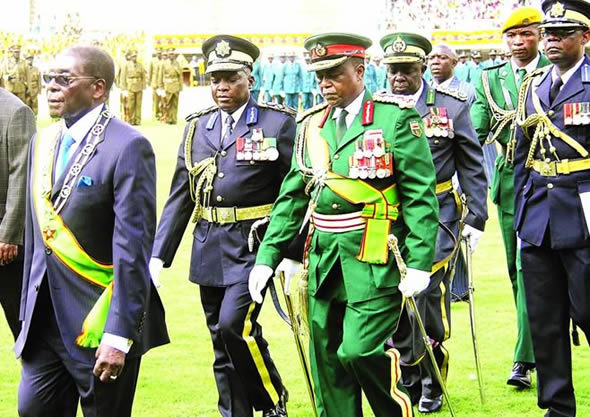By Lance Guma
Over the years Mugabe’s regime has deployed serving and retired soldiers into non-military structures, to ensure Mugabe remains in power. In Part 2 of this series SW Radio Africa looks at some of the individuals in both the army and Central Intelligence Organisation (CIO) who have helped keep Mugabe in power.

Job Wabira is a former permanent secretary in the Defence Ministry who in 1998 disregarded High Court rulings to release Standard newspaper journalists who had been arrested and tortured by the military, for writing a story about an alleged coup attempt. Mugabe also deployed him to be part of the 2004 Delimitation Commission, led by Justice George Chiweshe, himself a Retired Brigadier General.
Mugabe has also made sure he appoints retired soldiers in key parastatals. Retired Colonel Samuel Muvuti once headed the Grain Marketing Board (GMB) before his dismissal in 2008 on corruption allegations. In 2004 Mugabe appointed Retired Major-General Mike Nyambuya to the position of provincial governor of Manicaland and later Minister of Energy up to 2007.
The National Oil Company of Zimbabwe (NOCIZM) was at one time led by Retired Colonel Christian Katsande, who is now deputy secretary to Cabinet. The National Railways of Zimbabwe (NRZ) is under retired Air Commodore Michael Karakadzai who was appointed the General Manager.
In 2008 most of the Minerals Marketing Corporation of Zimbabwe board were abruptly replaced and in came retired Colonel Nelly Abu Basutu to lead the board. Her husband, Air Vice-Marshal Titus Abu Basutu, is deputy to the Air Force of Zimbabwe chief Perence Shiri. Most of the parastatals have been run down due to corruption and mismanagement.

It’s also reported that Information and Publicity Minister Webster Shamu is refusing to regularise the boards of the Broadcasting Authority, ZBC, ZimPapers, NewZiana, TransMedia and Kingstons because a total of eight senior military personnel are holding positions there to entrench ZANU PF’s grip. SW Radio Africa will continue profiling these people in this series.
In May 2008, Army Chief of Staff Major-General Martin Chedondo told soldiers at an army shooting championship in Harare that “the Constitution says the country should be protected by voting and in the 27 June presidential election run-off, pitting our defence chief Cde Robert Mugabe, and Morgan Tsvangirai of the MDC-T, we should, therefore, stand behind our Commander-in-Chief.”
Chedondo added: “Soldiers are not apolitical. Only mercenaries are apolitical. We have signed and agreed to fight and protect the ruling party’s principles of defending the revolution. If you have other thoughts, then you should remove that uniform.” Even when soldiers were deployed countrywide to abduct, torture and kill opposition supporters in the run up to the 2008 presidential run-off, Chedondo claimed they were there to help the police control political violence.
Addressing a rally in Masvingo in May 2008 Major-General Engelbert Rugeje said: “This country came through the bullet, not the pencil. Therefore, it will not go by your x of the pencil. We cannot let the efforts of such people as the late Chimombe to liberate this country just go to waste. Today I came here by helicopter with the late Chimombe’s body. The next time I will come next week to Jerera, the helicopter will be full of bullets. You know what you did.”
Rugeje was making the remarks after Tsvangirai had beaten Mugabe in the March 2008 presidential election. The intimidation was meant to ensure Mugabe won the run-off that the regime had engineered. In Mudzi in April 2008, soldiers reportedly handed out bullets to villagers and told them:
“If you vote for MDC in the presidential run-off election, you have seen the bullets; we have enough for each one of you, so beware.” To show that this was coordinated and had Mugabe’s blessings, the ZANU PF leader held his own rally at which he said:
“The war veterans came to me and said, ‘President, we can never accept that our country which we won through the barrel of the gun can be taken merely by an ‘x’ made by a ballpoint pen.’ Zvino ballpoint pen icharwisana ne AK? (will the pen fight the AK rifle?) Is there going to be a struggle between the two? Liyekele ukhupikisana lombhobho [do not argue with a gun].”
Before the March 2008 election, the head of the Zimbabwe Prison Service, Retired Major General Paradzai Zimondi, said:
“Our comrade, Defence Forces chief, our leader President Mugabe and comrade-in-arms will romp to victory. We say so because we have no apology to make to any house nigger and puppets. If the opposition wins the election, I will be the first one to resign from my job and go back to defend my piece of land. I will not let it go. I am giving you an order to vote for the President (Mugabe). Do not be distracted. I will only support the leadership of President Mugabe.”
Political commentator Phillan Zamchiya spoke to SW Radio Africa about this placement of military and CIO personnel in key roles:
“It’s a manifestation of the breakdown of ZANU PF structures. They are in disarray since Mugabe lost elections in 2008 and there was this popular ‘bhora musango- ball in the air campaign’ (where his own MP’s de-campaigned him). He no longer has trust in the ZANU PF structures and has to rely on the military men he thinks are still totally behind him.”
Zamchiya however warned that the military were not just ‘passive’ observers “they are patiently waiting in the wings to grab state power in the event Mugabe leaves power.” With the military so dominant in most political and economic structures in the country, it’s hard to dismiss Zamchiya’s warning. SW Radio Africa





